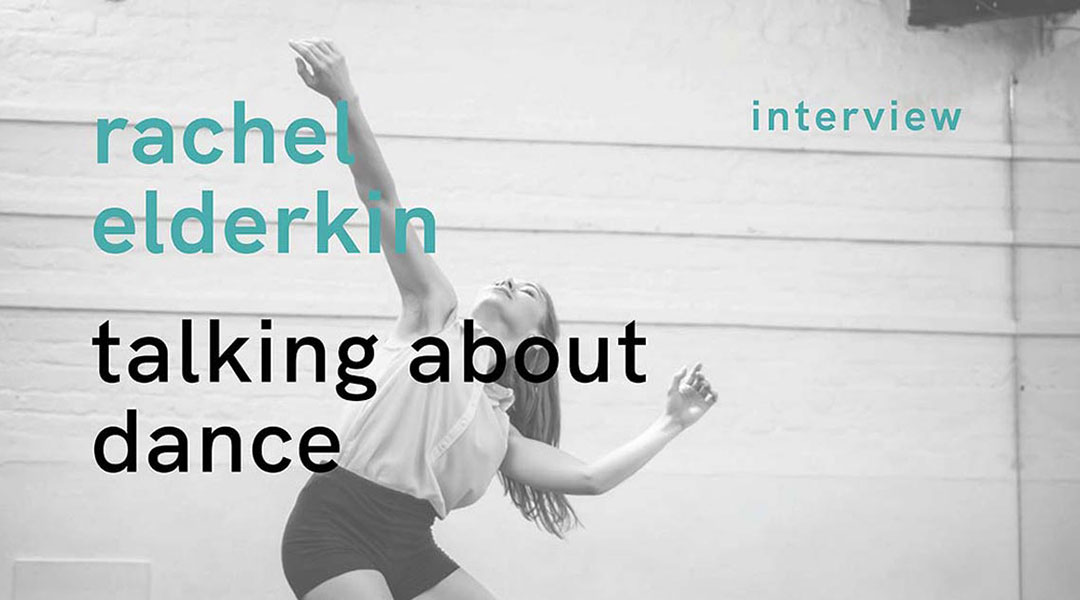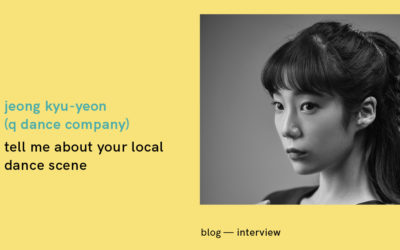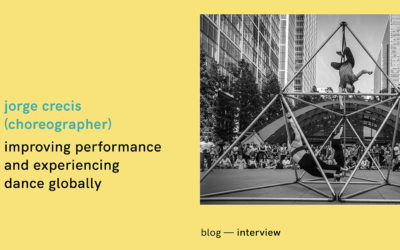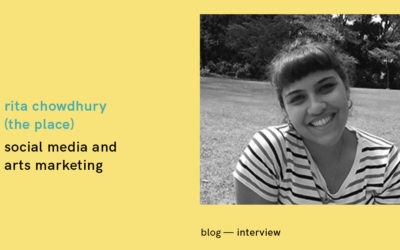Do dance podcasts work as a powerful tool to engage with the audience?
Interview with Rachel Elderkin
There are great differences in writing about dance and talking about dance. For Rachel Elderkin, working in both fields has been giving her more possibilities to bring artists closer to their audiences.
Hosting the podcast ‘Dance Dialogues’, the London-based dance artist also writes for The Stage and the international publication Fjord Review. During this interview, she shared with us her thoughts about the positive impacts of a dance podcast, the challenges of writing reviews and what matters in dance.
“To me, dance is still quite a niche and seen as something that maybe it’s difficult to understand and makes people think ‘Oh, this is not for me’. But at the end of the day, I think we all have a body – our bodies are very different but we all have one – so it’s something we can relate to and it’s not confined by language. It’s universal.”
Who are you?
I’m a freelance dance artist, writer and podcast host. During the last year, I’ve done a lot more in terms of writing and also on the podcast Dance Dialogues which started probably one year ago now. I’m based in London and my writing work is around dance. I do reviews, interviews and articles for The Stage and the international publication Fjord Review. So all kinds of fields are back to my work as a dancer and as a writer, they are interconnected. Let’s say that’s what I do and who I am… But I’m also figuring out who I am (laughs).
What is your contribution to your local contemporary dance scene?
Recently, my contribution has been the podcast that I’ve set up. I would like to be doing more in terms of my work as a dancer and a creator, but due to the circumstances and how the dance scene is, I’ve been doing a lot of more work in writing and with the podcast. With writing, I found a way to be able to talk about the work around me. However, writing has its restrictions – and that’s one of the reasons why I’ve started the podcast. ‘Dance Dialogues’ has given me the chance to have conversations with artists, space for people to share their work, their experiences and just for us to have a chat about what matters towards here. Yeah, that has been a great way to connect to what’s happening here in London.
Why did you decide to create the podcast Dance Dialogues?
I had to set it up because for me it was a way to avoid not being able to share people’s work and talk about it. I have a lot of friends who are dance artists and asked me ‘can you come and review my show?’ or ‘can you say something about my performance?’ and, as a friend, I can go and I can give them some words, something they can use for press releases or applications. But I felt that those were also a limitation about how I could write about it as well. So, to me (the podcast) it was a way to open it up and to try to find another form to talk about artists’ work. Reviews are useful, but they’re not always what people need and they don’t give much scope to talk about anything beyond the performance that you’ve just seen. So the podcast is just a space to be able to let people have these conversations and to share their ideas. I don’t think there’s much coverage of the independent sector, so this is a chance to be able to cover it up alongside the mainstream work as well. I hope it’s giving a chance to people to listen to each others’ experiences and to realize there are other people out there talking about the same topics and sharing them.
What is the mission of this podcast? What do you want to transmit after each episode?
I think the tagline of this podcast is to talk about what matters in dance right now. I’ve tried with the first series that every episode had a slightly different focus and people working across various areas, so we can mention different aspects of the sector – whether it’s contemporary dance or if it’s someone from the musical theatre as well. It covers things that are important to dance artists and that hopefully are relevant to them. It’s also space where people can listen to the others’ experiences and something they can relate to, which can make they feel that they’re not doing this on their own, especially freelancers who can feel quite alone. I hope that I talk about different aspects of the dance world and get people to share their different experiences.
You also write in different dance magazines. In your opinion, what are the differences between talking about dance and writing about dance?
This is a really interesting question… For me, writing about dance is a challenge. Words can be quite restrictive especially for dance, because you’re trying to capture something about a movement or an image and you can have multiple meanings in a piece, so when you’re writing you have to try to put it all down into a summary or a little phrase. So, words can be quite restrictive. But talking about dance… You can immediately understand the person’s experiences or whether it’s exciting for them or whether it touches them someway and that comes across when you’re talking, where there are spoken words. It’s kind of more open I think. So for me, there’s one big difference – when you’re talking about dance, you can get more suspense, you can get the way someone shares their experiences and gets you much deep and to have that connection with them.
With writing, the challenge is like taking that and putting the words back on top of it. And that can be difficult sometimes, finding the right language. For me, I try to be specific about what I saw and what’s the experience and I try to find the right fit for that. So, yeah, it is hard but I also enjoy that about it I think that’s the kind of exciting part of it.


Are interviews an effective way to engage artists with their audience?
I think interviews work as a chance to show the person behind the work – especially choreographers or people creating work. What the public sees on stage is like their products and interviews can show in real what they do, all the process behind it which takes a lot of work. And you don’t get to see it. When there’s an interview, it’s a chance for the artists to talk about who they are and why they do something, what it’s important to them, what drives them to create. So I think interviews give the chance to people become more connected to that person and understand a little bit more why the person does that work, rather than just seeing the final product. It’s a chance to be more in-depth – to be more human.
In your opinion, how does dance become a more accessible language for everyone?
To me, dance is still quite a niche and seen as something that maybe it’s difficult to understand and makes people think ‘Oh, this is not for me’. But at the end of the day, I think we all have a body – our bodies are very different but we all have one – so it’s something we can relate to and it’s not confined by language. It’s universal. So, whatever your background is, whatever you’re from, you can always understand what someone else is expressing with their body. So I think dance is open and accessible. And maybe in the dance world, we don’t talk enough or we don’t open up what we’re doing. So people think it’s something they won’t understand. But you can watch a piece of dance and you can take whatever you take from it. It’s not always something you need to understand – it just can be an experience, how that body speaks to you. So dance can be a more accessible language by just talk more, open up more and take dance to people. We don’t need to stay in our little boxes and just keep talking, keep having conversations and just inviting people in.




0 Comments